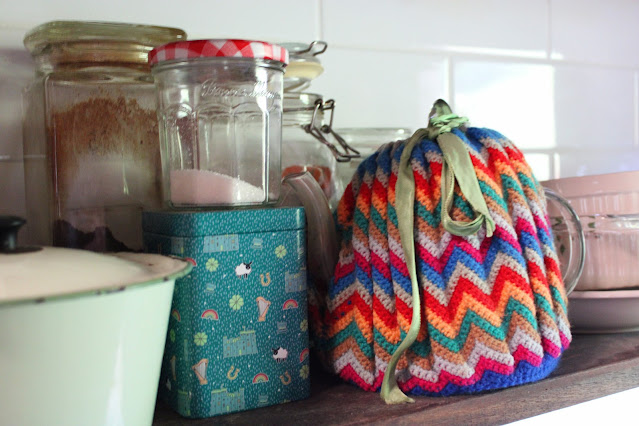Hello there,
Well, it has been a while, hasn't it? I'm sorry for my absence here, and to those of you who have been checking in with care and loyalty.
Life here on the farm has entered a different season in many ways, a wintering if you will. The farm is on hold while we build the extension, our goats have been dried up and are enjoying a rest for now, the chooks aren't laying due to winter, slugs have decimated my garden, the children are growing oh so quickly, and goodness I have been busy. Not a good busy - but more in a struggling, stumbling, deeply imperfect, trying not to drop all the balls busy. But I say this as I have just entered a period of being less busy for a spell, so here I am!
Sweet Elsie, the boys are not fans of photos these days!
This blog is named Barradale Farm, and on the farm front, there is little to write about at the moment. This has left me wondering how I can contribute to this space in a way that is relevant. We dream of good fencing and fat cattle grazing on our pasture, but this economy is bloody tough, and such expenses are out of our reach at this point in time. We are scrimping and saving to work on our extension, as the children are growing up and need some privacy and space. We have made some good progress on the extension, but it is slow. We are constantly short on cash and our machines, generator, and cars are old and often in need of repair.
When I started blogging all those years ago at "A Simple Living Journey", I was mostly a full-time stay-at-home mother. I did study part-time and work part-time in chaplaincy at one point, but the blog was a way of recording our lives, for keeping in contact with others who were also trying to live simply. Now, online communities have undergone significant changes. Many people are drawn to the shorthand, picture-perfect platform of Instagram or, more recently, Substack, which is more like blogging was back in the day.
My life has also changed considerably since then, and it is always hard to articulate such changes in the written word. But perhaps it is time I give it a crack.
A new to us wood oven. It's a much better design, draws better and burns more efficiently.
Firstly, I want to start off by reassuring you that Grant, the children and I are great. Times might be tough, but it is the season of life we are in, and due to the life choices we have made, things were never going to be easy. The reality is that many of us are struggling in this difficult economy. We are luckier than many as we have affordable and secure housing and nourishing food on the table, which is a tremendous blessing. This is something we do not take for granted.
If you have no interest in Christianity, you might like to scroll through the next part till the end, as I cannot exist here for much longer without sharing the broader picture of the journey I am on. My life does not exist in separate containers, just as I am sure yours doesn't. I decided to share here in a different way today, it is faith-heavy, and I understand that's not everyone's cup of tea. But as a woman in ministry in the online world (however small my presence might be), it feels inauthentic to keep these two parts of my life separate. I have hesitated sharing here as being a woman in ministry remains a controversial theological issue for many people, and as with many controversial things online, there are usually a group of people who feel the need to react in cruel and spiteful ways. Frankly, I can't be bothered delving into such conversations in the online sphere, so I generally avoid them, and I avoid triggering them. But then I found every time I sat to share here, the words wouldn't come. So here we are. It's an unusual post today, but don't worry, there are still plenty of the usual family/farm/progress updates in the future.
The truth is, the online homesteading movement, or the corner I seem to dwell in, is largely complementarian Christian women blogging and sharing their lives. Now I enjoy many of these accounts, and I see much beauty and wisdom in their stories. Over the years, I have been on my own faith journey. I started egalitarian (meaning believing God calls both men and women equally to serve in all levels and expressions of the church), and for a brief period, I questioned if this was the way I should be living out my own faith and explored complementarianism. Grant did not have any expectations in this; he simply encouraged me to work out my own path and where I felt God was calling me to. So I read, I studied, and I prayed. A lot. And over time, I felt myself growing further away from God than I ever had before. I felt like my spirit was suffocating. I soon came to realise I was on the entirely wrong path.

Tucker and Maisie on the deck.
So where did I end up? I believe we are built to know God. That the yearning which exists in our hearts for something more in life, for meaning and belonging, is a God shaped hole. Many of us search to fill it through various means of spiritual exploration. I land firmly in Christianity, but I have a great respect for people of all faiths, and also for those who hold no faith. Ultimately, I believe we are all beloved children of God, and God calls us to love one another fully, wholly and without exception. However, I do talk from a christian standpoint as this is my context and lens through which I view and live out my own faith and life.
I believe that as humans, we are an incredibly diverse group of people, and in this diversity lies tremendous beauty. When we look at the natural world, we see God's creation, and it is breathtaking. Humans are a part of God's creation (though we often mess it up and do dreadful, even horrendous things as we are given free will), and we are each called to live out our faith differently according to our gifts, natures and callings. For some, they believe God is calling them to a complementarian way of life and that is right and good for them. In the bible, we see a huge range of diversity in how people live out their christian lives within the ancient world.
Many of these stories in the bible come from male leaders, but what I cannot escape is that it is not all of God's story. There are many stories of amazing women in the bible. Often, these stories are not highlighted in the same way, but if you dig into the history and culture of the times, these stories are really important. There were women who led in both the Old and the New Testament. Women shared the message of Jesus, who ministered, who were called by God and who stepped up. And these stories happened within a patriarchal structure.

Now these days, the word patriarchy is a loaded, so bear with me on this. I am not attaching moral value to the word. Instead, I am using it in a very practical and pragmatic fashion. Ancient culture in the time and within the context of the bible was established and led largely by men. Much of this culture was also shaped by honour/shame, client/patron and the private/public arena, and it was possible, though not overly common, for women to be in positions of leadership. However, it is very important to note that these things are not understood in the same way today as they were then, so historical context matters a lot. This is where studying ancient history, Greek/Hebrew and applying thorough exegesis to the scriptures is essential to understand what was being said to a particular community, within a certain context at a very specific point in history. I have been doing this work for years now, guided by excellent professors and lecturers at bible college, as well as through reflections with my ministers. I continue to read from, appreciate and enjoy a diversity of theologians, catholic/protestant/old/new/conservative/liberal, and I have favourite authors and books from all theological backgrounds.
But through it all, I have come to view scripture through a firmly egalitarian lens. In my eyes, to do anything else is to not acknowledge the depth and the breadth of the stories in the bible and how God calls people to live out their faith. That is not to say I believe complementarianism is inherently wrong, because I don't. If a couple has prayed, read the bible and believes in their heart of hearts that that is the way that God is calling them to live out their faith within their marriage, then excellent. I hope and pray that it is a blessed and fruitful journey for them because great diversity does and should exist within God's story. We see this diversity within unity expressed in the Holy Trinity.
The new extension with its roof finally during a frosty winter morning.
There is a point to this theological reflection (however brief it may be, given the complexities I have touched upon) All of this is to say that through the encouragement, discernment and affirmation of my current and previous ministers (predominantly men for those interested), I have been in a period of discernment for ordination into the priesthood to the Anglican Church of Australia. That period has finished, and after a rigorous process, I am now in formation. This means I am in training to become an Anglican priest. This is why I have been so quiet these last few months. It is not a simple process and I will likely be in formation for the next 2-3 years. It has been wonderful, exciting, challenging and downright exhausting at times. All while juggling work, half-time theological study, building an extension, and juggling family life with Grant and our 4 children. Grant and I do not know exactly how this calling will be outworked in our lives, but we trust all will be well. I have Grant's full support and encouragement on this path, he is really happy for me and for us. For now, nothing changes. We remain living on our property and working just as we have been. Who knows, perhaps one day some of the children will want to build their own homes here, and the farm will become a multi-generational property.
If you have got this far, thanks! All of this is a rather long-winded and somewhat complex way of explaining my absence from this blog. I felt the need to speak in some depth due to the controversy around women in positions of leadership in some corners of the church. These conversations are growing louder at the moment as much of the world shifts to a more conservative position. Sadly, these conversations online are also often filled with spite and nastiness, which is incredibly disappointing to witness.
But I also wanted to share that I plan to continue here, however and whenever I can. There will likely be periods of absence and periods of presence depending on what is happening in our lives. Life is not as simple as it once was, but we continue to strive to live a simple, down-to-earth life as a family, the best we can. I imagine that as the extension comes along, there will be photos and progress to share, and both Grant and I dream of a time when we can develop the farm side of things once again. I am sure my next post will be more of a light-hearted, general catch-up you are used to! But I hope this finds you well.
Much love and blessings,
Emma





















































